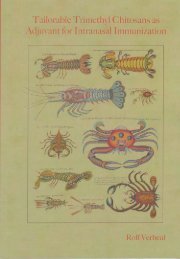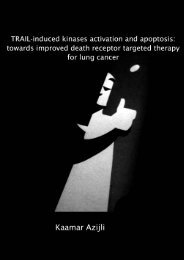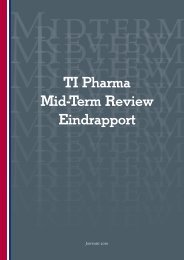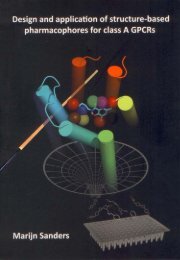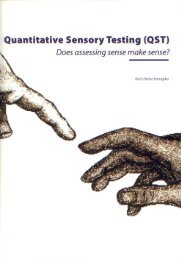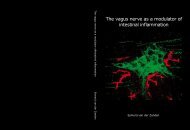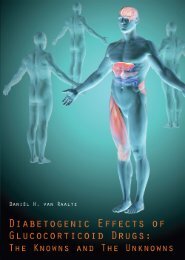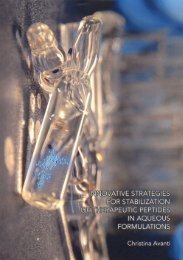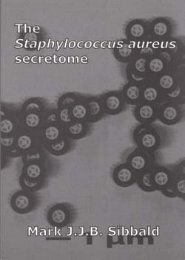- Page 2 and 3:
Experimental infection and protecti
- Page 4 and 5:
Experimental infection and protecti
- Page 6:
Contents Contents 5 Chapter 1 - Int
- Page 10 and 11:
Introduction 9 Malaria Malaria is o
- Page 12 and 13:
Introduction 11 Preclinical Clinica
- Page 14 and 15:
Introduction 13 pipeline of clinica
- Page 16 and 17:
Introduction 15 The division of ant
- Page 18 and 19:
Introduction 17 Figure 4. Populatio
- Page 20 and 21:
Introduction 19 candidates. Initial
- Page 22 and 23:
Introduction 21 - to identify param
- Page 24 and 25:
Introduction 23 20. Nussenzweig RS,
- Page 26 and 27:
Introduction 25 50. Ouedraogo AL, R
- Page 28:
Introduction 27 RTS,S/AS02 in malar
- Page 32 and 33:
Chapter 2 Safety and Immunogenicity
- Page 34 and 35:
Safety and Immunogenicity of a Reco
- Page 36 and 37:
Safety and Immunogenicity of a Reco
- Page 38 and 39:
Safety and Immunogenicity of a Reco
- Page 40 and 41:
Safety and Immunogenicity of a Reco
- Page 42 and 43:
Safety and Immunogenicity of a Reco
- Page 44 and 45:
Safety and Immunogenicity of a Reco
- Page 46 and 47:
Safety and Immunogenicity of a Reco
- Page 48 and 49:
Safety and Immunogenicity of a Reco
- Page 50 and 51:
Safety and Immunogenicity of a Reco
- Page 52 and 53:
Safety and Immunogenicity of a Reco
- Page 54 and 55:
Safety and Immunogenicity of a Reco
- Page 56 and 57:
Safety and Immunogenicity of a Reco
- Page 58 and 59:
Chapter 3 Humoral immune responses
- Page 60 and 61:
Humoral immune responses to a singl
- Page 62 and 63:
Humoral immune responses to a singl
- Page 64 and 65:
Humoral immune responses to a singl
- Page 66 and 67:
Humoral immune responses to a singl
- Page 68 and 69:
Humoral immune responses to a singl
- Page 70 and 71:
Humoral immune responses to a singl
- Page 72 and 73:
Humoral immune responses to a singl
- Page 74 and 75:
Humoral immune responses to a singl
- Page 76 and 77:
Humoral immune responses to a singl
- Page 78 and 79:
Humoral immune responses to a singl
- Page 80:
Humoral immune responses to a singl
- Page 83 and 84:
Chapter 4 82 Abstract The functiona
- Page 85 and 86:
84 Chapter 4 Figure 1. Schematic re
- Page 87 and 88:
86 Chapter 4 Concentration (mg/ml,
- Page 89 and 90:
88 Chapter 4 Figure 4: Correlation
- Page 91 and 92:
90 Chapter 4 positively correlated
- Page 93 and 94:
92 Chapter 4 Acknowledgements The a
- Page 95 and 96:
94 Chapter 4 determinant of subsequ
- Page 98 and 99:
Chapter 5 Comparison of clinical an
- Page 100 and 101:
Comparison of clinical and parasito
- Page 102 and 103:
Comparison of clinical and parasito
- Page 104 and 105:
Comparison of clinical and parasito
- Page 106 and 107:
Comparison of clinical and parasito
- Page 108 and 109:
Comparison of clinical and parasito
- Page 110 and 111:
Comparison of clinical and parasito
- Page 112 and 113:
Comparison of clinical and parasito
- Page 114 and 115:
Comparison of clinical and parasito
- Page 116 and 117:
Comparison of clinical and parasito
- Page 118 and 119:
Chapter 6 Efficacy of pre-erythrocy
- Page 120 and 121:
Efficacy of pre-erythrocytic and bl
- Page 122 and 123: Efficacy of pre-erythrocytic and bl
- Page 124 and 125: Efficacy of pre-erythrocytic and bl
- Page 126 and 127: Efficacy of pre-erythrocytic and bl
- Page 128 and 129: Efficacy of pre-erythrocytic and bl
- Page 130 and 131: Chapter 7 NF135.C10: a new Plasmodi
- Page 132 and 133: NF135.C10: a new Plasmodium falcipa
- Page 134 and 135: NF135.C10: a new Plasmodium falcipa
- Page 136 and 137: NF135.C10: a new Plasmodium falcipa
- Page 138 and 139: NF135.C10: a new Plasmodium falcipa
- Page 140 and 141: NF135.C10: a new Plasmodium falcipa
- Page 142 and 143: NF135.C10: a new Plasmodium falcipa
- Page 144 and 145: NF135.C10: a new Plasmodium falcipa
- Page 146 and 147: NF135.C10: a new Plasmodium falcipa
- Page 148 and 149: NF135.C10: a new Plasmodium falcipa
- Page 150 and 151: NF135.C10: a new Plasmodium falcipa
- Page 152 and 153: Chapter 8 Induction of malaria in v
- Page 154 and 155: Induction of malaria in volunteers
- Page 156 and 157: Induction of malaria in volunteers
- Page 158 and 159: Induction of malaria in volunteers
- Page 160 and 161: Induction of malaria in volunteers
- Page 162 and 163: Induction of malaria in volunteers
- Page 164 and 165: Induction of malaria in volunteers
- Page 166 and 167: Induction of malaria in volunteers
- Page 168 and 169: Induction of malaria in volunteers
- Page 170 and 171: Induction of malaria in volunteers
- Page 172: Section 3 Whole parasite inoculatio
- Page 177 and 178: 176 Chapter 9 Figure 1. Study desig
- Page 179 and 180: 178 Chapter 9 followed by five iden
- Page 181 and 182: 180 Chapter 9 Figure 2. Parasitemia
- Page 183 and 184: 182 Chapter 9 Test Day I-1 Day C-1
- Page 185 and 186: 184 Chapter 9 strain P. falciparum-
- Page 187 and 188: 186 Chapter 9 protective role in ot
- Page 189 and 190: 188 Chapter 9 References 1. Greenwo
- Page 191 and 192: 190 Chapter 9 27. Orjih AU. Acute m
- Page 193 and 194: 192 Chapter 9 medium A (Caltag Labo
- Page 195 and 196: 194 Chapter 10 Abstract Induction o
- Page 197 and 198: 196 Chapter 10 Pre-erythrocytic sta
- Page 199 and 200: 198 Chapter 10 procedures described
- Page 201 and 202: 200 Chapter 10 by hand-dissection.
- Page 203 and 204: 202 Chapter 10 Figure 3. Mean numbe
- Page 205 and 206: 204 Chapter 10 Figure 4. Number of
- Page 207 and 208: 206 Chapter 10 temperature (Pearson
- Page 209 and 210: 208 Chapter 10 immune modulating ef
- Page 211 and 212: 210 Chapter 10 cytokine measurement
- Page 213 and 214: 212 Chapter 10 14. Hermsen CC, Telg
- Page 216 and 217: Chapter 11 General Discussion
- Page 218 and 219: General Discussion 217 occurrence o
- Page 220 and 221: General Discussion 219 mediating th
- Page 222 and 223: General Discussion 221 AMA1 express
- Page 224 and 225:
General Discussion 223 troponins ca
- Page 226 and 227:
General Discussion 225 and between
- Page 228 and 229:
General Discussion 227 immunologica
- Page 230 and 231:
General Discussion 229 to induce pr
- Page 232 and 233:
General Discussion 231 Conclusions
- Page 234 and 235:
General Discussion 233 References 1
- Page 236 and 237:
General Discussion 235 polymorphonu
- Page 238 and 239:
General Discussion 237 57. Church L
- Page 240 and 241:
General Discussion 239 85. Beier JC
- Page 242 and 243:
General Discussion 241 118. Mueller
- Page 244:
Chapter 12 Summary Samenvatting Lis
- Page 247 and 248:
246 Chapter 12 Controlled human mal
- Page 250 and 251:
Summary, Samenvatting, List of publ
- Page 252:
Summary, Samenvatting, List of publ
- Page 255 and 256:
254 Chapter 12 Roestenberg M, Teirl
- Page 258 and 259:
Summary, Samenvatting, List of publ
- Page 260 and 261:
Summary, Samenvatting, List of publ
- Page 262:
Summary, Samenvatting, List of publ



